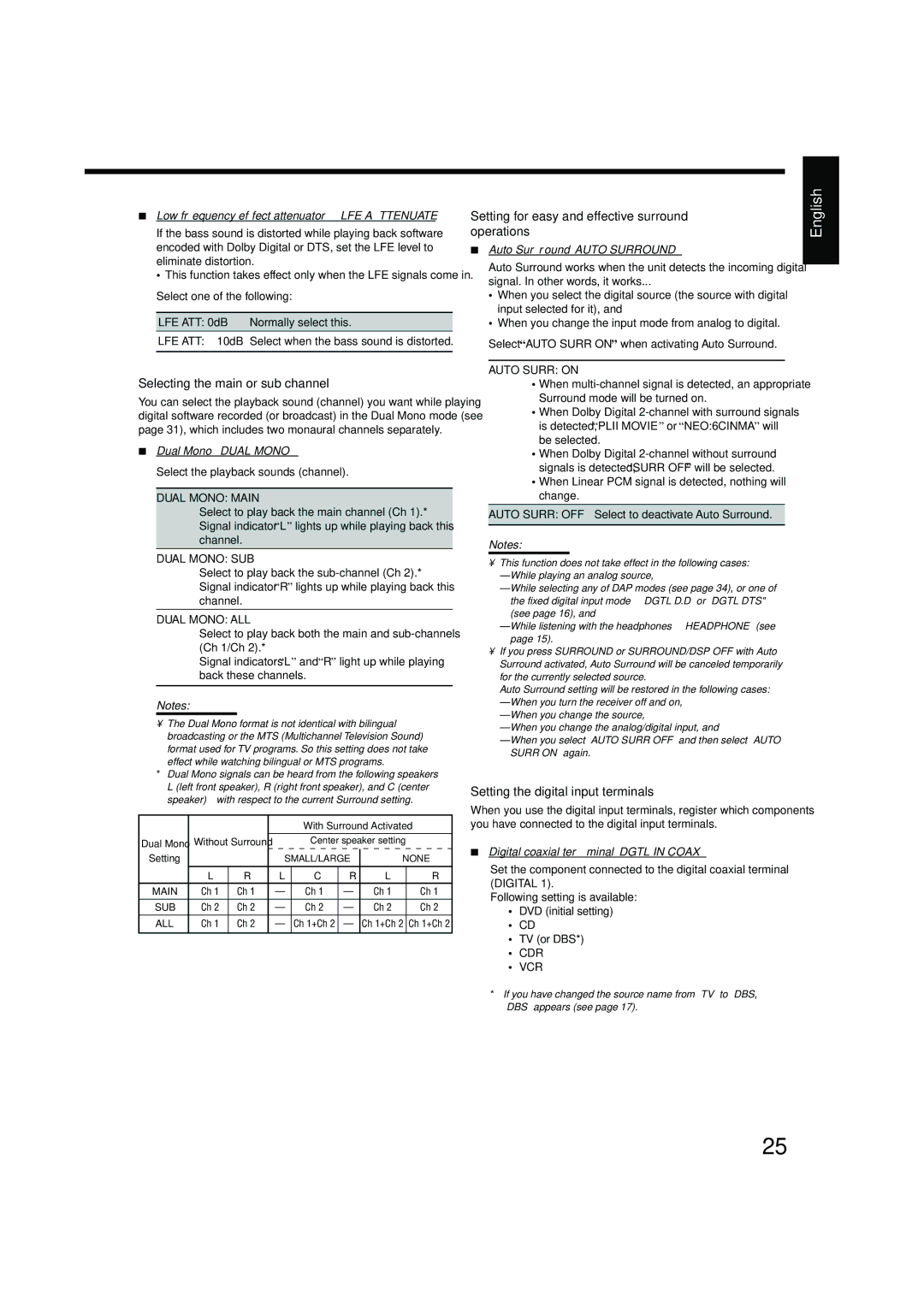
7Low frequency effect attenuator—LFE ATTENUATE
If the bass sound is distorted while playing back software encoded with Dolby Digital or DTS, set the LFE level to eliminate distortion.
• This function takes effect only when the LFE signals come in.
Select one of the following:
LFE ATT: 0dB Normally select this.
LFE ATT: −10dB Select when the bass sound is distorted.
Selecting the main or sub channel
You can select the playback sound (channel) you want while playing digital software recorded (or broadcast) in the Dual Mono mode (see page 31), which includes two monaural channels separately.
7Dual
Select the playback sounds (channel).
DUAL MONO: MAIN
Select to play back the main channel (Ch 1).*
Signal indicator “L” lights up while playing back this channel.
DUAL MONO: SUB
Select to play back the
Signal indicator “R” lights up while playing back this channel.
DUAL MONO: ALL
Select to play back both the main and
Signal indicators “L” and “R” light up while playing back these channels.
Notes:
•The Dual Mono format is not identical with bilingual broadcasting or the MTS (Multichannel Television Sound) format used for TV programs. So this setting does not take
effect while watching bilingual or MTS programs.
*Dual Mono signals can be heard from the following speakers— L (left front speaker), R (right front speaker), and C (center
|
|
|
|
|
|
| With Surround Activated |
|
|
|
|
|
| |||||||||||||||||||||
|
|
|
|
|
|
|
|
|
|
|
|
|
|
|
|
|
|
|
|
|
|
|
|
|
|
|
|
|
|
|
| |||
Dual Mono | Without Surround |
|
|
|
|
|
| Center speaker setting |
|
|
|
|
|
| ||||||||||||||||||||
Setting |
|
|
|
|
|
|
|
|
|
|
|
|
|
|
|
|
|
|
|
|
|
|
|
|
|
|
|
|
|
|
|
|
|
|
|
|
|
| SMALL/LARGE |
|
|
|
|
|
|
|
|
|
| NONE |
|
|
|
|
|
| |||||||||||||
| L | R | L |
|
|
| C |
| R |
|
|
|
| L |
|
| R | |||||||||||||||||
MAIN | Ch 1 | Ch 1 | — |
|
| Ch 1 |
| — |
|
| Ch 1 |
| Ch 1 | |||||||||||||||||||||
SUB | Ch 2 | Ch 2 | — |
|
| Ch 2 |
| — |
|
| Ch 2 |
| Ch 2 | |||||||||||||||||||||
|
|
|
|
|
|
|
|
| ||||||||||||||||||||||||||
ALL | Ch 1 | Ch 2 | — | Ch 1+Ch 2 |
| — | Ch 1+Ch 2 | Ch 1+Ch 2 | ||||||||||||||||||||||||||
|
|
|
|
|
|
|
|
|
|
|
|
|
|
|
|
|
|
|
|
|
|
|
|
|
|
|
|
|
|
|
|
|
|
|
Setting for easy and effective surround operations
7Auto Surround—AUTO SURROUND
Auto Surround works when the unit detects the incoming digital signal. In other words, it works...
•When you select the digital source (the source with digital input selected for it), and
•When you change the input mode from analog to digital.
Select “AUTO SURR ON” when activating Auto Surround.
AUTO SURR: ON
•When
•When Dolby Digital
•When Dolby Digital
•When Linear PCM signal is detected, nothing will change.
AUTO SURR: OFF Select to deactivate Auto Surround.
Notes:
•This function does not take effect in the following cases:
–While playing an analog source,
–While selecting any of DAP modes (see page 34), or one of the fixed digital input
–While listening with the
•If you press SURROUND or SURROUND/DSP OFF with Auto Surround activated, Auto Surround will be canceled temporarily for the currently selected source.
Auto Surround setting will be restored in the following cases:
–When you turn the receiver off and on,
–When you change the source,
–When you change the analog/digital input, and
–When you select “AUTO SURR OFF” and then select “AUTO SURR ON” again.
Setting the digital input terminals
When you use the digital input terminals, register which components you have connected to the digital input terminals.
7Digital coaxial
Set the component connected to the digital coaxial terminal (DIGITAL 1).
Following setting is available:
•DVD (initial setting)
•CD
•TV (or DBS*)
•CDR
•VCR
*If you have changed the source name from “TV” to “DBS,” “DBS” appears (see page 17).
English
25
